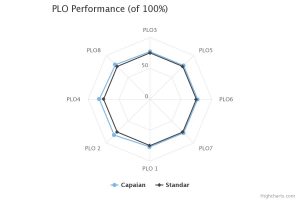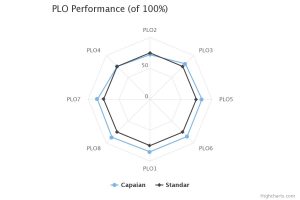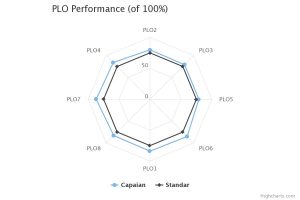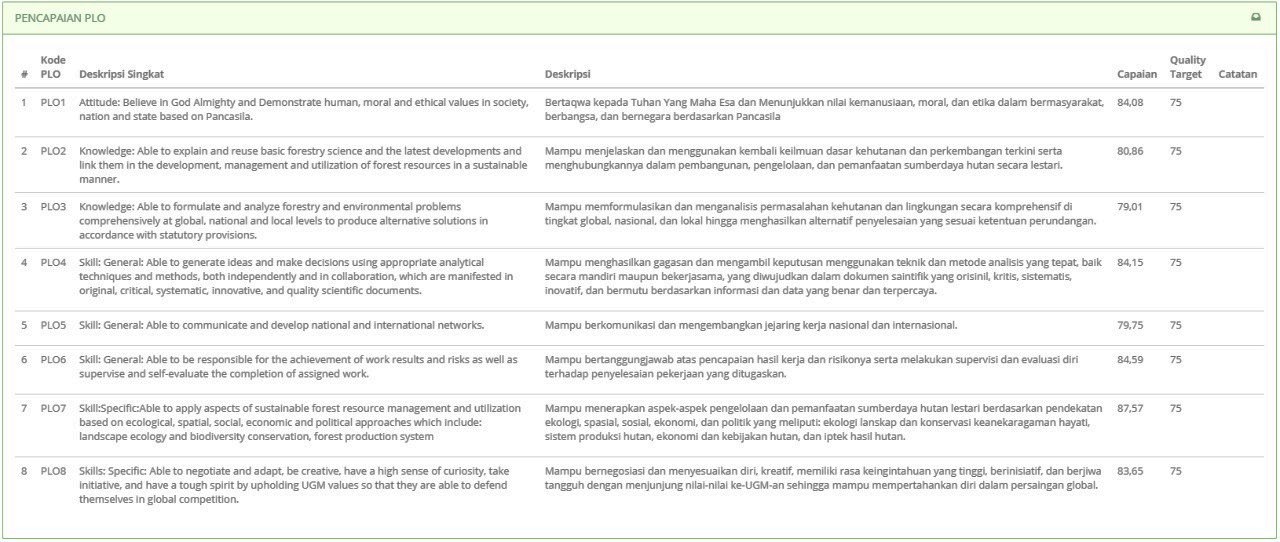Curriculum 2018 – Forestry Study Program (S1/Undergraduate)
Faculty of Forestry – Universitas Gadjah Mada
Reviewing The Curriculum 2010

In 2013, the curriculum 2010 had run for three years, when there was the 50th Anniversary of the Faculty of Forestry UGM celebrating with an important National Seminar. This seminar invited speakers from several senior alumni. They discussed the development of higher education in forestry, which is expected to form professional forestry graduates. Attended by many alumni, the National Seminar held in September 2013 concluded that it is required to implement a revision of the forestry higher education curriculum. A curriculum revision is needed to be able to produce forestry graduates who are more proficient in forestry knowledge, competent, professional, ethical, and have skills that support their profession. Following the seminar result, the Faculty of Forestry reviewed the Curriculum 2010 through various workshops and tracer studies until the establishment of the Curriculum 2018. The strengthening analysis of the Curriculum 2018 is shown in the following table.

Scientific Vision The Curriculum 2018
The scientific vision of forestry which is a consideration in forestry higher education in the Curriculum 2018 provides knowledge in the field of forestry. Forestry science vision base on Forest and Human Ecology for Sustainable Development with a landscape approach. Forestry science studies forest ecology with a landscape approach with human interaction both inside and outside the area for sustainable development. Nationalism and UGM values with the emphasis on socio-preneurship as a characteristic of UGM are translated into basic subjects at the university level including Contextual Religion, Pancasila Education, Citizenship Education, and Indonesian Language.
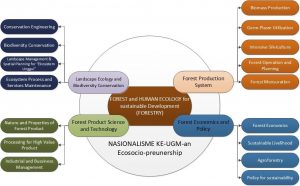
The Graduates Profile of Forestry Study Program (S1)
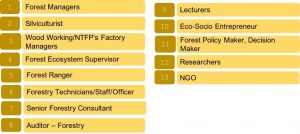
The Curriculum 2018 Structure
The number of semester credit units (SKS) of courses that must be taken to complete the education in the Forestry Undergraduate Study Program is 144 credits with the composition:
- Compulsory courses totaling 114 credits (79%) including KKN and Undergraduate Thesis, and
- Guided Elective courses as many as 20 credits (14%),
- Elective courses as many as 6 credits (4%),
- Compulsory of cross-disciplinary courses as many as 8 credits (6%) in the form of 2 credits of Agroforestry courses. Several courses, i.e. Forest Biology (2 credits), Agrarian Law and Forestry Legislation (2 credits), and Forestry Entrepreneurship (2 credits), are implicity interdisciplinary due to involving Forestry lectures and other faculties of Biology, Law, and Economics and Business.
- The compulsory Global Competency Exposure course is 2 credits (1%), namely the International Forestry course, 2 credits.
The total credit load for the compulsory group of subjects in the Curriculum 2018 to meet the aspects of PLO is as follows:
– Attitude Aspect: 10 courses with a load of 23 credits (10.64%)
– Knowledge Aspect: 42 courses with a load of 87 credits (40.27%)
– General skills aspect: 39 subjects with a load of 63 credits (29.16%)
– Specific skills aspect: 29 courses with a load of 43 credits (19.90%).
The Curriculum 2018 responds to forestry conditions and the needs of the job market by offering several new courses:
- Forest Biology
- Forestry Mathematics and Statistics
- Forest Climatology and Hydrology
- Agrarian Law and Forestry Legislation
- Economic Valuation of Forest Resources
- Forest and Land Rehabilitation
- Forestry Entrepreneurship
- Research Design
- International Forestry
- Agroforestry
- Forestry Problems
and add practical skills needed to support their knowledge, include
- Practice of Wood Basic Properties
- Practice of Primary Timber Processing
- Practice of Secondary Timber Processing and NTFP
- Practice of Nature Tourism
- Practice of Forestry Mathematics and Statistics
- Practice of Research Design.
The Evaluation of Program Learning Outcome (PLO)
OBE-based learning in the Forestry Study Program (Undergraduate/S1) provides students with impacts or learning outcomes for their education process. The learning outcomes are felt by students in the form of attitudes, skills, and knowledge. The PLOs in the Curriculum 2018 are evaluated for their achievements every semester. The evaluation of the PLOs evaluation process of the learning process implementing the Curriculum 2018 is the form of accountability of the Forestry Study Program (S1) UGM to students, parents, community, and the government. The evaluation shows that all PLOs of the Forestry Study Program (S1) pass the standard value (75). Therefore the learning in the Forestry Study Program (S1) UGM gives students good impacts or outcomes in the form of attitude, knowledge, and skills.
